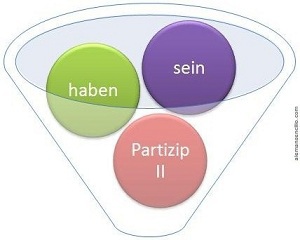The Perfect in German (Perfekt)
The "Perfekt" is the most used past tense in German.
The "Perfekt" is used in spoken and non-formal written language with non-modal verbs.

Use of the "Perfekt"
The "Perfekt" is the most used verb tense for referring to past actions in German. It is used for 3 situations:
To refer to a past action without any relation to the present
Theory says that, for a past action without any relation to the present, the Präteritum should be used. In practice, however, this is only true for the written language and modal verbs. The Perfekt is used in the spoken language (or in non-formal written language) with non-modal verbs. Perfekt is used more in southern German and Präteritum is used more often in northern Germany.
Er hat gestern Fußball gespielt
He played soccer yesterday
To refer to a past action that continues in the present
If the action continues in the present, the use of the Perfekt is mandatory.
Wir sind nach Spanien gereist
We travelled to Spain (and we still are there)
To refer to an action that will be completed in the future
To give "Perfekt" this connotation of being in the future, it is necessary to add a temporal particle that indicates the future. This may seem a bit odd to you.
Ich habe es nächste Woche geschafft
I'll have it done next week
Conjugating the "Perfekt"
The conjugation of the "Perfekt" is easy enough. It is constructed with the verb "sein" or "haben" in the present indicative + "Partizip II" of the verb.
Ich habe ein Bild gemalt
I have painted/ I painted a picture
Sie ist schon angekommen
She has already arrived / She arrived already
When to use the auxiliary verbs "haben" and "sein"
- "Sein" is only used as an auxiliary verb:
- For the verbs "sein", "passieren", "bleiben", "werden".
- For intransitive verbs and non-reflexive verbs that indicate movement or a change in state such as: rennen (to run), springen (to jump), laufen (to walk), fallen (to fall), gehen (to walk), sterben (to die), schmelzen (to melt), etc.
- The auxiliary verb "haben" is used in all other cases.
- There are some verbs that can be transitive or intransitive depending on the sentence which is why they will sometimes have sein or haben as auxiliary verbs. Examples that we have are:
fahren (to drive), biegen (to turn), verderben (to spoil), brechen (to break), fliegen (to fly), treten (to step on, to go), schneiden (to separate, to cut), reiten (to ride).
How Partizip II is constructed
It depends on what type of verb you are dealing with:
Regular verbs without a prefix
ge - (VERB STEM) -(e)t
| Infinitiv | Partizip II | Meaning |
| kauf-en | ge-kauf-t | to buy |
| regn-en | ge-regn-e-t | to rain |
An "-e-" between the stem and the final "-t" is added with some verbs (for more details, see the present indicative)
Regular verbs with a separable prefix
(SEPARABLE PREFIX) - ge - (VERB STEM) -(e)t
| Infinitiv | Partizip II | Meaning |
| auf-rund-en | auf-ge-rund-e-t | to round up |
| ein-kauf-en | ein-ge-kauf-t | to go shopping |
Regular verbs with inseparable prefix
(INSEPARABLE PREFIX) - (VERB STEM) -(e)t
| Infinitiv | Partizip II | Meaning |
| be-nutz-en | be-nutz-t | to use |
| ent-wickel-n | ent-wickel-t | to develop |
Verbs ending with "-ieren"
(VERB STEM) -t
| Infinitiv | Partizip II | Meaning |
| studier-en | studier-t | to study (at the University) |
| rotier-en | rotier-t | to rotate |
Irregular verbs
Many of the irregular verbs follow the construction:
ge - (VERB STEM) -(e)n
Example:
| Infinitiv | Partizip II | Meaning |
| backen | gebacken | to bake |
| braten | gebraten | to fry |
| fahren | gefahren | to drive |
| fallen | gefallen | to fall |
| fangen | gefangen | to catch |
But, unfortunately, most irregular verbs do not follow any easy rule to learn:
Examples:
| Infinitiv | Partizip II | Meaning |
| haben | gehabt | to have |
| werden | geworden | to become |
| wissen | gewusst | to know |
| verlieren | verloren | to lose |
This link has most of the irregular verbs' participles in German.
The passive voice of the Perfekt
The construction of the passive voice in the "Perfekt" consists of:
[sein conjugated in the present] + PARTIZIP II + worden.
As a reminder: "Worden" is the Partizip II of the verb "werden" when it acts as an auxiliary verb.
If the sentence in the active voice in the "Perfekt" is:
He has read a book
Er hat ein Buch gelesen
The equivalent sentence in the passive voice would be:
The book has been read by him
Das Buch ist von ihm gelesen worden
The "Perfekt" with modal verbs
With modal verbs it is much more common to use the "Präteritum" than the "Perfekt" to indicate the past.
- If the modal verb is accompanied by another verb (99% of the cases), the structure is:
Verb haben + THE INFINITIVE OF THE FULL VERB + THE INFINITIVE OF THE MODAL VERB
Er hat nicht fliegen wollen
He hasn't wanted to fly / He didn't want to fly - If there is no full verb, the structure is
Verb haben + PARTIZIP II OF THE MODAL VERB
Er hat nicht gewollt
He didn't want to / He hasn't wanted to
Next Lessons:
home > : Präsens Indikativ | Konjunktiv II | Konjunktiv I | Präteritum | Plusquamperfekt | Futur | Partizip II | Imperativ | Modal Verbs | Conjugation | Passive | Irregular verbs
Suggestions to Help You | Difficulties with learning German | Greetings